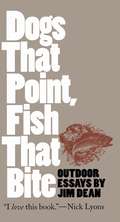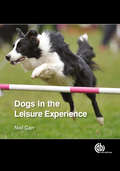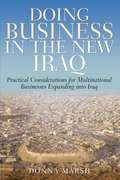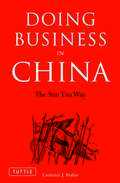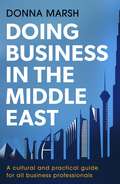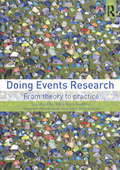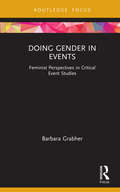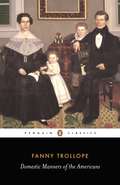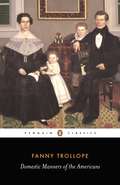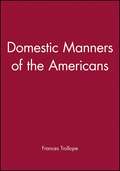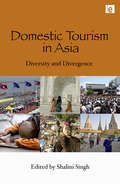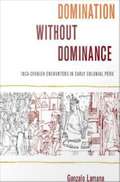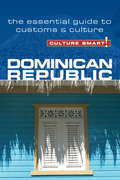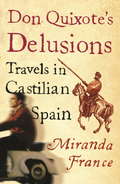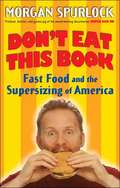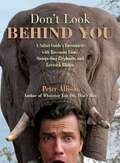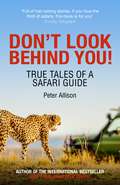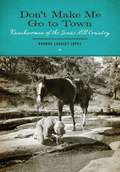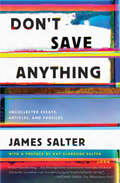- Table View
- List View
Doghiker: Great Hikes with Dogs from the Adirondacks through the Catskills (Excelsior Editions)
by Alan ViaMuch more than a guidebook showing readers great places to hike with their canine companions in upstate New York, Doghiker is a dog owner's operating manual and tool kit. A lifelong dog owner, Alan Via makes a strong case for responsible ownership and offers guidance on selecting a canine hiking companion, training, safety, appropriate gear, canine first aid, and keeping your dog fit and healthy. Covering the Adirondacks through the Catskills, and areas in between, this unique guidebook includes seventy-seven beautiful hikes that are great for dogs. Each hike has a custom topographic map showing parking areas, trails, viewpoints, water sources, and other points of interest. Included are a peak-finder map and chart showing every hike and a summary of rating categories, as well as information on total mileage, elevation gain, ratings for views, difficulty level, dog safety and hazards, hiker traffic, trail conditions, and whether a leash is suggested or required. Detailed driving directions for each outing, including GPS coordinates for key intersections and trailheads, are also provided. By presenting all of this information, drawn from Via's forty-plus years of hike leadership, readers can easily evaluate which hike fits their needs and get outside and explore the great outdoors with their four-legged friends.
Dogs That Point, Fish That Bite
by Jim DeanJim Dean, longtime editor of Wildlife in North Carolina, offers his personal observations on the pleasures and frustrations of hunting, fishing, camping, and other outdoor pursuits. Dogs That Point, Fish That Bite draws together fifty of the best columns that Dean has written for the magazine over the last seventeen years. The witty, sometimes poignant pieces are arranged into a loose chronicle of the sporting year, with a generous allowance for digression: the first is set in April, on the opening day of trout season, and the last tells of a New Year's Day spent alone in a mountain cabin. At first glance, hunting and fishing are the focus of most of the columns. Often, however, Dean is after bigger game. A crab that escapes the pot leads him to reflect on the capricious nature of life. The restoration of a cabin at the old family farm evokes memories of family and simpler times. And a May panfishing trip takes on the quality of ritual, performed by two old friends. The consistent theme uniting all the essays is the celebration of wild places and rural traditions that have become endangered in our modern world."Earthy, intimate, brilliant, and always wise, these outdoor essays spring from the heart and mind of a replete hunter and fisherman. Jim Dean is among the top few writer-sportsmen in America--and I love this book.--Nick Lyons, author of Confessions of a Fly-Fishing Addict "Jim Dean brings you his outdoors with long experience, pleasant sentiment and unforgettable wry humor. His hunting, fishing and camping life may have centered in his beloved North Carolina but his pilgrimages to other fields and waters have spiced his stories with memorable comparisons. His book will last.--Charles F. Waterman, author of Black Bass and the Fly Rod Jim Dean, longtime editor of Wildlife in North Carolina, shares his personal observations on the pleasures and frustrations of hunting, fishing, camping, and other outdoor pursuits in this gem of a book. Dogs That Point, Fish That Bite draws together fifty of Dean's best essays, arranged into a loose chronicle of the sporting year--from the opening day of trout season to a New Year's Day spent alone in a mountain cabin. A witty and sometimes poignant collection, it celebrates the wild places and rural traditions that have become endangered in our modern world.-->
Dogs in the Leisure Experience
by Neil CarrThis book explores the social and cultural constructions and debates of what are dogs and what is leisure. It looks at how working dogs play a significant role in leisure experiences such as ensuring the safety of air transport, and considers the differing roles and changing acceptance of dogs' involvement in sport. Within the setting of the animal welfare and sentience debates, it examines the leisure needs of dogs and their owners. Providing an original contribution to our understanding of dogs as both participants and objects in the leisure experience, this book is a useful resource for researchers in leisure, hospitality and tourism.
Dogs in the Leisure Experience
by Neil CarrThis book explores the social and cultural constructions and debates of what are dogs and what is leisure. It looks at how working dogs play a significant role in leisure experiences such as ensuring the safety of air transport, and considers the differing roles and changing acceptance of dogs’ involvement in sport. Within the setting of the animal welfare and sentience debates, it examines the leisure needs of dogs and their owners. Providing an original contribution to our understanding of dogs as both participants and objects in the leisure experience, this book is a useful resource for researchers in leisure, hospitality and tourism.
Doing Business In The New Iraq: Practical Considerations For Multinational Businesses Expanding Into Iraq
by Donna MarshIraq, with its educated, sophisticated and relatively wealthy population, has been effectively off limits to most outsiders for the past 30 years. However, with the scaling down of violent activity and the establishment of a new, albeit fragile government, many multinational companies are giving serious consideration to setting up a presence in this market. This book provides cultural and business intelligence for all organisations who are considering doing business in Iraq. All of the practical issues of working in this exciting yet challenging environment are addressed, from safety issues to establishing reliable business partners, and including thoughts about the future. It includes: - A brief overview of Iraq - geography, demographics, structure, economy,weather - Religious demographics in Iraq, and their effect on business and other practicalities - Travelling to Iraq - practical and regional considerations - How to communicate effectively in Iraq - Getting down to business and achieving business goals - The impact of globalisation in Iraq and throughout the greater Middle East
Doing Business In The New Iraq: Practical Considerations for Multinational Businesses Expanding into Iraq
by Donna MarshIraq, with its educated, sophisticated and relatively wealthy population, has been effectively off limits to most outsiders for the past 30 years. However, with the scaling down of violent activity and the establishment of a new, albeit fragile government, many multinational companies are giving serious consideration to setting up a presence in this market. This book provides cultural and business intelligence for all organisations who are considering doing business in Iraq. All of the practical issues of working in this exciting yet challenging environment are addressed, from safety issues to establishing reliable business partners, and including thoughts about the future. It includes: - A brief overview of Iraq - geography, demographics, structure, economy,weather - Religious demographics in Iraq, and their effect on business and other practicalities - Travelling to Iraq - practical and regional considerations - How to communicate effectively in Iraq - Getting down to business and achieving business goals - The impact of globalisation in Iraq and throughout the greater Middle East
Doing Business in China
by Laurence J. Brahm"Strike hard, retreat, seize a position, reject compromise, and strike again." --These are common negotiating tactics in a country with a long history of strategic philosophy.Negotiating a deal in China requires patience-a well-known Confucian virtue; persistence-something which comes with time; and survival instincts-something that comes with persistence. For both the uninitiated, negotiations in China may come as a culture shock, laced with frustration. For the experience China trade negotiator, it is a never-ending learning process. For both parties, the secret to negotiating in China may well lie in the knowledge of the military ploys described in China's ancient classics.Drawing from the lessons of China's ancient military classic, Sun Tzu's The Art of War, Laurence J. Brahm applies these strategies to the foibles and successes of foreign and Chinese negotiators in China struggling to bridge cultural gaps in the process of closing deals. This revealing and humorous book offers a collection of real-life "war stories" and untold truths about hard knocks at the negotiating table. It is essential reading for business executives planning their business strategies for entering the Chinese market, and for mastering the art of negotiating.
Doing Business in China
by Laurence J. Brahm"Strike hard, retreat, seize a position, reject compromise, and strike again." --These are common negotiating tactics in a country with a long history of strategic philosophy.Negotiating a deal in China requires patience-a well-known Confucian virtue; persistence-something which comes with time; and survival instincts-something that comes with persistence. For both the uninitiated, negotiations in China may come as a culture shock, laced with frustration. For the experience China trade negotiator, it is a never-ending learning process. For both parties, the secret to negotiating in China may well lie in the knowledge of the military ploys described in China's ancient classics.Drawing from the lessons of China's ancient military classic, Sun Tzu's The Art of War, Laurence J. Brahm applies these strategies to the foibles and successes of foreign and Chinese negotiators in China struggling to bridge cultural gaps in the process of closing deals. This revealing and humorous book offers a collection of real-life "war stories" and untold truths about hard knocks at the negotiating table. It is essential reading for business executives planning their business strategies for entering the Chinese market, and for mastering the art of negotiating.
Doing Business in the Middle East: A cultural and practical guide for all business professionals
by Donna MarshThis new and updated book is necessary reading for all professionals working in the Middle East and North Africa, it includes: - The practical impact of Islam on business- Safety and security in the region- Business etiquette- Political and social do's and don'ts The practicalities of doing business in the MEA region are covered in detail, from the initial visit to establishing productive working relationships, including opening an office in the region. It also focuses on issues of particular importance to all businesswomen, and for men who might be working with Arab and Muslim women.
Doing Events Research: From Theory to Practice
by Dorothy Fox Mary Beth Gouthro Yeganeh Morakabati John BrackstoneEvents Management is a rapidly expanding discipline with growing student numbers however currently there are no specifically focused Research Methods texts available to serve this growing cohort. Fulfilling the need for a relevant book which reflects the unique characteristics of research in the field this title provides students with innovative ideas and inspiration to undertake their own research work and informs them of the wide diversity of research strategies and contexts that are available. Content is written from a researcher’s point of view and provides a step by step guide to accomplishing a project or dissertation in the field of events. The reader is guided right from the beginning in selecting a topic for research, identifying aims, objectives and questions and then determining which research methods are the most appropriate and practical. They are then shown how to analyze and interpret their data as well as writing up the project. Whilst many current texts are skewed either towards qualitative or quantitative methods, Doing Events Research provides a balanced coverage of both. It incorporates not only traditional research methods, but also contemporary techniques such as using social networking websites and Google analytics. Specific research case studies are integrated to make applications accessible to events students and show the unique characteristics of researching in this field. A range of useful learning aids spur critical thinking and further students’ knowledge. This book is visually accessible and whilst written in an engaging style nonetheless maintains academic rigor grounded in research and scholarship. This is essential reading for all events students.
Doing Gender in Events: Feminist Perspectives in Critical Event Studies (Routledge Critical Event Studies Research Series.)
by Barbara GrabherExploring the relationship between gender and events, this book delivers an ethnographic analysis of the celebration of gender equality in the context of the culture-led event. Drawing upon Critical Event Studies, Anthropology of the Festive and Gender Studies, this book provides a comprehensive understanding of the entangled, conceptual entities of gender and events. Through a gendered analysis of the culture-led event, Hull UK City of Culture 2017, this work expands epistemological perspectives relevant to the study of events in general and City/ Capital of Culture initiatives in particular. Driven by a feminist, collaborative methodological approach, the book draws on four years of ethnographic, qualitative research in the city of Hull and its celebration of the title, UK City of Culture in 2017 and provides an in-depth analysis of how audiences engage, performances enact, and infrastructures condition the production of cultures of gender equality in the citywide celebration. This will be a valuable resource for upper-level students and academics in the field of Event Studies, Cultural Policy, Geography, Anthropology and Gender Studies.
Domestic Manners of the Americans
by Fanny TrollopeWhen Fanny Trollope set sail for America in 1827 with hopes of joining a Utopian community of emancipated slaves, she took with her three of her children and a young French artist, leaving behind her son Anthony, growing debts and a husband going slowly mad from mercury poisoning. But what followed was a tragicomedy of illness, scandal and failed business ventures. Nevertheless, on her return to England Fanny turned her misfortunes into a remarkable book. A masterpiece of nineteenth-century travel-writing, Domestic Manners of the Americans is a vivid and hugely witty satirical account of a nation and was a sensation on both sides of the Atlantic. Edited and with notes and introduction by Pamela Melville-Singleton.
Domestic Manners of the Americans
by Fanny TrollopeWhen Fanny Trollope set sail for America in 1827 with hopes of joining a Utopian community of emancipated slaves, she took with her three of her children and a young French artist, leaving behind her son Anthony, growing debts and a husband going slowly mad from mercury poisoning. But what followed was a tragicomedy of illness, scandal and failed business ventures. Nevertheless, on her return to England Fanny turned her misfortunes into a remarkable book. A masterpiece of nineteenth-century travel-writing, Domestic Manners of the Americans is a vivid and hugely witty satirical account of a nation and was a sensation on both sides of the Atlantic.
Domestic Manners of the Americans
by John Lauritz Larson Frances TrollopeRichly informative on American manners and morals in the early ninteenth century, this famous travel account also reveals much about the contrast between British and American culture.
Domestic Tourism in Asia: Diversity and Divergence
by Shalini SinghMany countries have a rich tradition of domestic travel and holidaying which not only predates but exceeds mass international travel. This is particularly the case in Asia where recent economic prosperity and trends in globalization have not merely spurred, but continue to shape traditions in domestic tourism. This book is the first to address specifically the continuities and changes in domestic tourism in Asia. It explores the ethos of domestic travel and holiday-making in order to understand the distinctive common strands that underlie conventional and contemporary tourism practices, against the local and global backdrop. A considerable range of countries is covered in the case studies, including those with patrimonial histories, namely China and India, the economically developed nation-state of Japan and the microstates of Taiwan, Singapore, Macao and Hong Kong, besides the coastal countries of Malaysia, Philippines, Laos and Vietnam, as well as the land-locked countries of Kyrgyzstan and Mongolia. The book presents some of the many interfaces of Asian cultural and natural heritages with tourism, while giving due considerations to today's political and economic realities.
Domination Without Dominance: Inca-Spanish Encounters in Early Colonial Peru
by Gonzalo LamanaOffering an alternative narrative of the conquest of the Incas, Gonzalo Lamana both examines and shifts away from the colonial imprint that still permeates most accounts of the conquest. Lamana focuses on a key moment of transition: the years that bridged the first contact between Spanish conquistadores and Andean peoples in 1531 and the moment, around 1550, when a functioning colonial regime emerged. Using published accounts and array of archival sources, he focuses on questions of subalternization, meaning making, copying, and exotization, which proved crucial to both the Spaniards and the Incas. On the one hand, he re-inserts different epistemologies into the conquest narrative, making central to the plot often-dismissed, discrepant stories such as books that were expected to talk and year-long attacks that could only be launched under a full moon. On the other hand, he questions the dominant image of a clear distinction between Inca and Spaniard, showing instead that on the battlefield as much as in everyday arenas such as conversion, market exchanges, politics, and land tenure, the parties blurred into each other in repeated instances of mimicry. Lamana's redefinition of the order of things reveals that, contrary to the conquerors' accounts, what the Spanairds achieved was a "domination without dominance. " This conclusion undermines common ideas of Spanish (and Western) superiority. It shows that casting order as a by-product of military action rests on a pervasive fallacy: the translation of military superiority into cultural superiority. In constant dialogue with critical thinking from different disciplines and traditions, Lamana illuminates how this new interpretation of the conquest of the Incas revises current understandings of Western colonialism and the emergence of still-current global configurations.
Dominican Republic - Culture Smart!
by Ilana Benady Ginnie BedggoodOccupying the eastern two-thirds of island of Hispaniola, the Dominican Republic has something for almost everyone - except perhaps obsessive perfectionists. If you can relax and go with the flow you will experience a land of great environmental diversity with a rich and varied culture, a turbulent history, some infuriating idiosyncrasies, and a people whose friendliness is legendary. The Dominicans are flamboyant, irrepressible, generous, headstrong, and resilient. Their culture is a distinctive mix of an easygoing Caribbean nature coupled with Latino verve and showmanship. For those who choose to break out of the confines of all-inclusive tourist resorts, Culture Smart! Dominican Republic offers a tantalizing insight into this warm, vital, and intriguing people. It takes you on a journey from the unspoiled coastline to the agricultural interior, to the imposing mountains and to the hamlets where time appears to have stood still. It then catapults you into the twenty-first century, through poverty and opulence, to the hustle and bustle of the large cities and the lifestyles of the luxury coastal tourist resorts. It offers practical advice on what to expect and to how to behave in a Dominican home, or in social and work settings. The authors of this book, both long-term residents in the Dominican Republic, have provided a unique roadmap to the interesting and challenging experiences that await you in this beautiful, varied, and complex country.
Don Quixote's Delusions: Travels In Castilian Spain
by Miranda FranceA humorous and affectionate look at modern Spain, and a celebration of the country's greatest book, from the pen of a brilliant young writer.When in 1987 Miranda France spent a year living in Madrid, the post-dictatorship ebullience was at its height. Pornography and soft drugs were legalised alongside more basic freedoms, such as divorce, party-affiliation and kissing in the street. In 1998 she returned to make a journey through the great cities and towns of central Spain - Madrid, Toledo, Segovia, Salamanca and others. With the new prosperity, much has changed. But much has also endured, as she learns from the people she meets, who include a private detective, a shepherd, various nuns, two belly dancers and a Castilian separatist. She also discovers that Cervantes' DON QUIXOTE' published in 1605 and the most translated book after the Bible - is a work of genius which still helps to explain the Spanish character: today's Spaniards still suffer from Don Quixote's delusions, and are as stubborn, inflexible and unrealistic as they have always been.
Don Quixote's Delusions: Travels in Castilian Spain
by Miranda FranceA humorous and affectionate look at modern Spain, and a celebration of the country's greatest book, from the pen of a brilliant young writer.When in 1987 Miranda France spent a year living in Madrid, the post-dictatorship ebullience was at its height. Pornography and soft drugs were legalised alongside more basic freedoms, such as divorce, party-affiliation and kissing in the street. In 1998 she returned to make a journey through the great cities and towns of central Spain - Madrid, Toledo, Segovia, Salamanca and others. With the new prosperity, much has changed. But much has also endured, as she learns from the people she meets, who include a private detective, a shepherd, various nuns, two belly dancers and a Castilian separatist. She also discovers that Cervantes' DON QUIXOTE' published in 1605 and the most translated book after the Bible - is a work of genius which still helps to explain the Spanish character: today's Spaniards still suffer from Don Quixote's delusions, and are as stubborn, inflexible and unrealistic as they have always been.
Don't Eat This Book: Fast Food and the Supersizing of America
by Morgan Spurlock"Benevolent muckraker" Morgan Spurlock debuts a wry investigative voice that will appeal to anyone interested in the health of our country, our children, and ourselves.
Don't Look Behind You!: A Safari Guide's Encounters with Ravenous Lions, Stampeding Elephants, and Lovesick Rhinos
by Peter AllisonIncredible true tales from a world-renowned safari guide and celebrated authorRomantic notions aside, being a safari guide isn&’t always particularly enjoyable or glamorous. Quite often it is beset with challenges, like having to spend a night in a thorn tree with marauding hyenas below. But safari guide Peter Allison lives for such moments. Here, the author of the widely praised Whatever You Do, Don&’t Run details his time spent in safari camps not only in Botswana but also in South Africa, Mozambique, and Namibia—places he loves, despite how much it feels like they might just be trying to kill him.In Don&’t Look Behind You, Allison recounts adventures few would live to tell. Like the time he and a group of bored guides launched a makeshift raft into a foaming, flooded river teeming with hippos and crocodiles. Or the afternoon he heard monkeys telling him that a leopard was walking around the camp, and then realized the leopard was in his tent, with him in it.In addition to relating his encounters with animals, Allison shares the stories of those tourists who have long been pushing him toward early retirement. Normally respectful of all his fellow creatures no matter how many feet they have, Allison fantasizes about leaving one in particular behind on the Skeleton Coast, a place that receives less than half an inch of rain a year, and is patrolled by lions and hyenas. Join Peter Allison for another riveting, rollicking, behind-the-scenes dose of everyone&’s dream experience—going on safari—and come through amazed but, thankfully, without a scratch.
Don't Look Behind You!: True Tales of a Safari Guide
by Peter AllisonJoin a top safari guide for hair-raising and hilarious tales of South Africa, animals and close escapes.It shouldn't be fun to be charged by an animal that could easily crush you, but top safari guide Peter Allison gets an odd thrill every time an elephant charges his beaten-up Jeep or a peckish crocodile looks at him sideways. By now you'd think the bestselling author of DON'T RUN, Whatever You Do would know how to keep out of trouble. But from avoiding territorial hippos and hungry lions to dodging landmines and getting lost on the unforgiving savannah, Peter has had his fair share of close calls. Drawing on his experiences in South Africa, Botswana, Mozambique and Namibia, Don't Look Behind You! is another book of funny, true safari stories, perfect for telling around a campfire.
Don't Make Me Go to Town
by Rhonda Lashley LopezMany people dream of "someday buying a small quaint place in the country, to own two cows and watch the birds," in the words of Texas ranchwoman Amanda Spenrath Geistweidt. But only a few are cut out for the unrelenting work that makes a family ranching operation successful. Don't Make Me Go to Town presents an eloquent photo-documentary of eight women who have chosen to make ranching in the Texas Hill Country their way of life. Ranging from young mothers to elderly grandmothers, these women offer vivid accounts of raising livestock in a rugged land, cut off from amenities and amusements that most people take for granted, and loving the hard lives they've chosen. Rhonda Lashley Lopez began making photographic portraits of Texas Hill Country ranchwomen in 1993 and has followed their lives through the intervening years. She presents their stories through her images and the women's own words, listening in as the ranchwomen describe the pleasures and difficulties of raising sheep, Angora goats, and cattle on the Edwards Plateau west of Austin and north of San Antonio. Their stories record the struggles that all ranchers face-vagaries of weather and livestock markets, among them-as well as the extra challenges of being women raising families and keeping things going on the home front while also riding the range. Yet, to a woman, they all passionately embrace family ranching as a way of life and describe their efforts to pass it on to future generations.
Don't Save Anything: Uncollected Essays, Articles, and Profiles
by James Salter"In Don’t Save Anything . . . Kay Eldredge Salter assembles her late husband’s bread–and–butter journalism—yet how delicious good bread and butter can be! . . . As always, Salter emphasizes simple, vivifying details." —Michael Dirda, The Washington Post One of the greatest writers of American sentences in our literary history, James Salter’s acute and glimmering portrayals of characters are built with a restrained and poetic style. The author of several memorable works of fiction—including Dusk and Other Stories, which won the PEN/Faulkner Award—he is also celebrated for his memoir Burning the Days and many nonfiction essays. In her preface, Kay Eldredge Salter writes, “Don’t Save Anything is a volume of the best of Jim’s nonfiction—articles published but never collected in one place until now. Though those many boxes were overflowing with papers, in the end it’s not really a matter of quantity. These pieces reveal some of the breadth and depth of Jim’s endless interest in the world and the people in it . . . One of the great pleasures in writing nonfiction is the writer’s feeling of exploration, of learning about things he doesn’t know, of finding out by reading and observing and asking questions, and then writing it down. That’s what you’ll find here.” This collection gathers Salter’s thoughts on writing and profiles of important writers, observations of the changing American military life, evocations of Aspen winters, musings on mountain climbing and skiing, and tales of travels to Europe that first appeared in The New Yorker, Esquire, People, Condé Nast Traveler, the Aspen Times, among other publications.
Don't Sit Under the Grits Tree with Anyone Else But Me
by Lewis GrizzardMore down-home humor from Lewis Grizzard. Ruminations on lardbutts. bra-padders. Good ol'boys and giggling Yankee girls. The joys of white bread and knowing your way around a 1957 Chevrolet. And lots more from one of America's favorite writers. Other books by Lewis Grizzard are available in this library.

